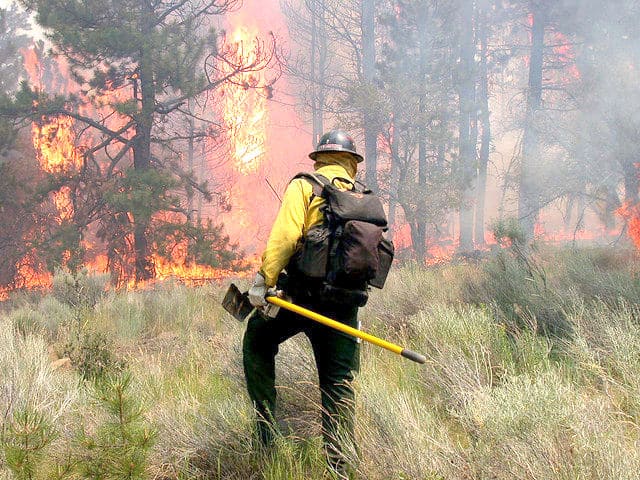Caveat: I have not been following the ins and outs of what’s currently in the bills, but The Nature Conservancy has this as a draft letter to Senators and Representatives.. on their site here. It makes it easy to contact them and you can even tweet more or less automatically!
Fix the wildfire funding problem
As wildfires grow hotter and larger, Congress must lead the way to preserve our national parks and forests, along with our homes, from disaster.That’s why I am asking you to support a comprehensive wildfire funding fix like the Wildfire Disaster Funding Act (H.R. 2862 and S. 1842) or section 102 of S. 1571 in the Senate. These proposals are supported by broad, bipartisan organizations, including conservation, timber, tribal, recreation, sportsmen and employer groups.
A comprehensive fire fix would change how the federal government budgets for wildfire suppression, bringing the process in line with the way other disasters are funded. A comprehensive solution includes: 1) addressing the continued erosion of agency budgets that results from increasing suppression costs; 2) accessing disaster funding for extraordinarily costly fires; and 3) significantly reducing the need to “borrow” from non-suppression budget accounts and programs.
You have an opportunity to act now by including this solution in an upcoming disaster relief package. I’m asking you to support that effort.
Protecting American homes, lands, and wildlife from catastrophic fires grows more important with every passing fire season. Please fix the wildfire funding problem before the next major fire strikes!
My question to those who keep up with this.. is this one of the controversial bills? It was hard to tell from a brief glance.

It’s mostly a political power play. The Republicans know damn well that western Democrats want fire funding. The R’s aren’t willing to give it up without some major concessions regarding forest management and litigation. Anyway, fires will continue to be ‘funded’ but, it’s just a matter of where that funding will come from.
See? Even partisan politics is more important than public safety and Forest Service budgets…. as always.
It sounds as if this is a bipartisan effort (Denver Post story here)
I’m also assuming that there will be bipartisan opposition to such a bill, for different reasons. This Administration loves to wield its leverage, and wants more concessions from the Democrats, seeking to impact laws for decades, instead of just a few years. It is unclear how or if the Republicans will split on logging issues. If I was a Republican, I would use all the ‘bargaining chips’ to force a compromise on the Democrats that will loosen the chains on the Forest Service, discretion-wise. We’ll see if Congress is willing to craft a compromise that can reach the President’s desk.
As a forester and former USFS fire information officer, on an overhead team, I cringe when folks say “catastrophic fires.” From an ecological perspective fires are NOT catastrophic and I’ve heard Dr. Jerry Franklin say just that. He went on to say that from a human perspective a fire may be catastrophic if it damages someone’s home.
Side note – what did that homeowner do to fireproof their home and reduce the risk of ignition knowing that they live in the WUI?
I’ve done a little on-line research and found that the USFS spends more per acre on suppression than either the BLM or National Park Service . I was on the Yellowstone helitack crew some years ago and have spent lots of time in the western National Parks and BLM lands. From a forest type and fuel loading perspective I don’t think those lands differ much from National Forest land. Makes me wonder if there are cultural differences in the USFS fire organization that lead to higher costs for suppression?
Great points Oldwoodsman.
RE: “Makes me wonder if there are cultural differences in the USFS fire organization that lead to higher costs for suppression?”
My perspective is ‘yes.’
Is a fire catastrophic if kills whole watersheds of old growth trees? Is a fire catastrophic if reduces a forest to rocks and dead snags. I think it is. The forest might come back or it might not. Are we talking about what is good for the forest? Or is whatever happens to the forest good even if it means the forest that was there is gone?
I think the FS spends more on “suppression” because they believe fire is good for the resource and have unlimited money to spend once a fire gets so big.
This year’s bi-partisan HR 2682 (introduced by a R, with 35 R and 54 D cosponsors), looks a lot like one in last year’s session that got sidelined by the more controversial bills and didn’t get out of committee. I’d assume a similar strategy this year (if not doubling down).
See https://forestpolicypub.com/2017/10/26/wildfire-legislations-nepa-provisions-generate-divisions/
Also addressed in the Senate appropriations bill: “Also included in bill language is a fire cap adjustment that would end the practice of “fire borrowing” and make fire suppression expenditures above 100 percent of the 10-year average eligible for disaster assistance, along with forest management reforms designed to reduce this risk of wildfire and improve management of national forests. Senate Appropriations Ranking Member Patrick Leahy, D-VT, said the bill is not bipartisan.”
http://www.hpj.com/ag_news/senate-appropriations-releases-interior-environment-bill/article_f66f880a-d6ce-11e7-9f28-1b13f403a70a.html